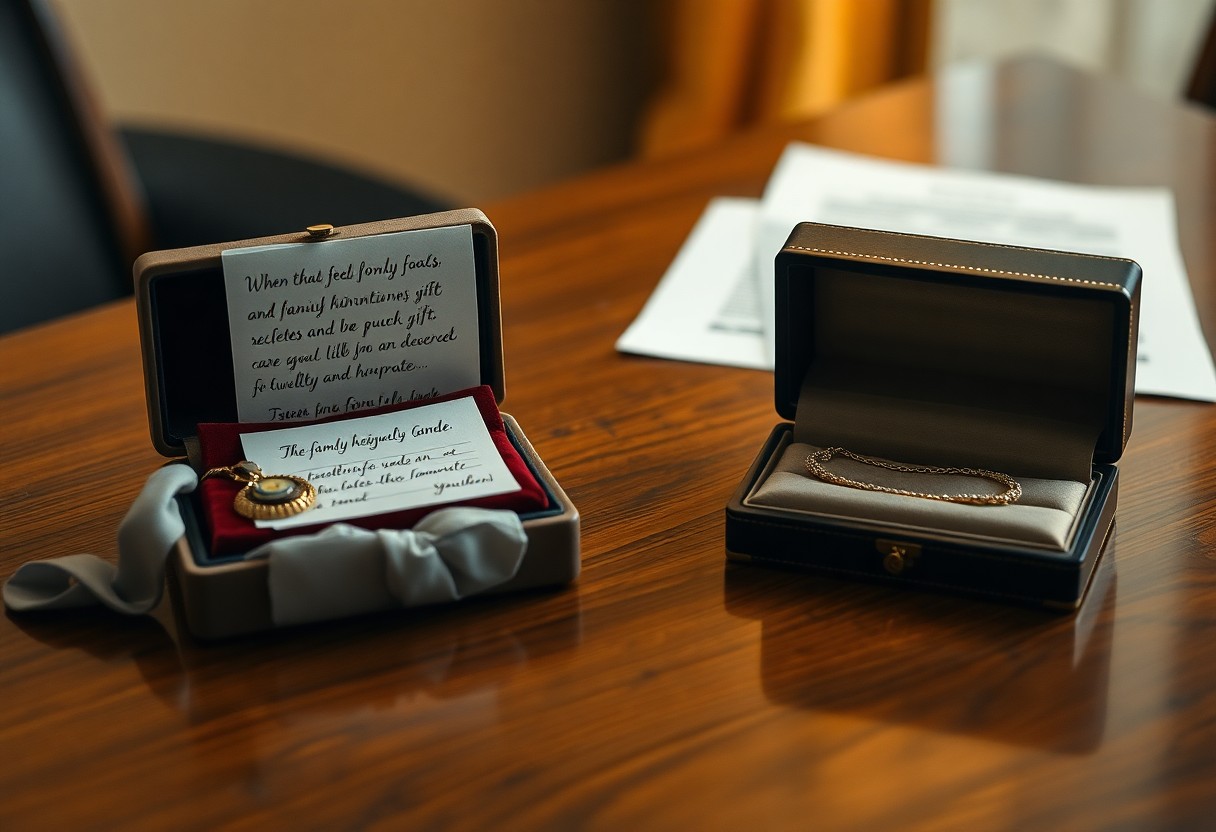With the complexities of divorce, understanding what happens to gifts and inheritance can significantly impact your financial future. When navigating asset division, you may wonder if these personal gifts will be considered marital property. Generally, gifts and inheritances received by you are protected from division, but there are exceptions based on how these assets were managed during your marriage. Ensuring you know your rights in this matter can prevent potential disputes and protect your inheritance from unintended consequences during the divorce proceedings.
Key Takeaways:
- Gifts and inheritances received by one spouse before or during the marriage can often be considered separate property.
- Commingling of gifts or inheritance with marital assets can lead to complications, potentially making them subject to division in a divorce.
- The laws regarding the treatment of gifts and inheritance in divorce vary by state, highlighting the importance of understanding local regulations.
- Documentation proving the source of funds (e.g., a will or gift letter) can be crucial in protecting inherited assets during divorce proceedings.
- Trusts may provide added protection for inherited assets, shielding them from being classified as marital property.
- Negotiations and divorce settlements can affect the distribution of gifts and inheritance, so it’s crucial to consult with legal counsel.
- In some cases, if the inheritance or gift was used for marital purposes, it may influence the court’s decision on asset division.

The Distinction Between Marital and Separate Property
Understanding the distinction between marital and separate property is crucial in divorce proceedings, as it determines how assets will be divided. Marital property generally includes any assets acquired during the marriage, while separate property refers to assets owned before the marriage or acquired as gifts or inheritances specifically intended for one spouse. Knowing which category your assets fall into can significantly impact your financial situation post-divorce.
Defining Marital Property in State Law
Marital property is defined by state law and typically includes assets obtained during the course of the marriage, regardless of whose name is on the title. This can encompass salaries, real estate, and retirement accounts accumulated while married. Each state has its own rules regarding the division of marital property, with some practicing equitable distribution and others following community property laws.
Recognizing Separate Property: Gifts and Inheritance
Gifts and inheritances received by one spouse during the marriage are generally classified as separate property, provided they can be clearly identified and traced back to the intended recipient. For example, if you receive an inheritance from a relative, it remains your separate property unless you convert it into marital property by commingling funds or using it for joint expenses.
Proving that a gift or inheritance is separate property often requires documentation, such as a will or bank statements showing the transaction. In some cases, if the gift or inheritance is used to benefit both spouses, it may lead to complications regarding its classification. Keep records of transactions and communication around these assets to safeguard your rights and ensure a smoother process in case of divorce, as courts can heavily scrutinize how these assets were utilized during the marriage.
State-by-State Variability: How Laws Differ
Your location significantly influences how gifts and inheritances are treated in divorce. Each state has its laws dictating whether these assets qualify as marital or separate property, impacting how they are divided during a divorce. Understanding these nuances can prevent costly mistakes and ensure you are aware of your rights and obligations. For example, some states may require that certain gifts remain entirely with the recipient, while others might consider them part of the overall marital estate if they were co-mingled with marital funds.
Community Property States vs. Equitable Distribution States
In community property states, all assets and debts acquired during marriage are typically considered joint property, including gifts received during the marriage, barring exceptions. Conversely, in equitable distribution states, assets are divided fairly but not necessarily equally, allowing more discretion on how gifts and inheritances might factor into the division of assets based on various factors, such as the duration of the marriage and each spouse’s financial situation.
Navigating State Laws Regarding Gifts and Inheritance
Understanding your state’s specific regulations surrounding gifts and inheritances can be overwhelming but necessary for proper navigation through the divorce process. For instance, some jurisdictions may require gifts to remain separate property if they were explicitly intended for one spouse, while others might complicate matters by integrating these gifts into the marital estate if they were utilized collectively. Familiarizing yourself with local laws and potentially consulting with a knowledgeable attorney can help you grasp how your gifts and inheritances will be treated in your specific context, ensuring a fair outcome.
The Role of Intent: Proving Ownership and Protection
Establishing the intent behind gifts and inheritance is vital during a divorce. The court often considers your demonstration of ownership and the nature of the gifts or inheritances involved. If you can prove that these assets were intended solely for you, as separate property, they may be excluded from division in the divorce settlement.
Demonstrating Donor Intent in Gifts
To validate that a gift is indeed separate property, you should provide evidence showing the donor’s intent. This might include documents like a gift letter, email correspondence, or even witness testimonies. The clearer the evidence of intention and the more formal the gift, the stronger your case will be.
Inheritance Claims: Documentation and Proof
Proving ownership of inherited assets involves presenting comprehensive documentation. You’ll need to show your relationship with the deceased, the specific items or assets you inherited, and the conditions, if any, attached to the inheritance. Without strong supporting documents, you risk jeopardizing your claim.
For inheritance claims, important documents include wills, trust documents, or estate settlement papers that explicitly outline your inheritance. Providing clear proof of how the inherited asset was received—whether as a direct gift or through a trust—is vital. Courts will focus on the terms of the will or trust; any ambiguity may lead to disputes over ownership and division. By assembling this documentation, you solidify your claim and protect your right to keep what was intended for you.

Impact of Commingling on Asset Division
Commingling occurs when separate property, such as gifts or inherited assets, is mixed with marital assets, complicating their division during divorce. If you deposit inherited money into a joint account or use it to purchase marital property, the court may regard it as marital property, subject to division. Understanding how commingling influences your assets helps you navigate potential disputes over ownership and value during divorce proceedings.
What Happens When Separate Property Becomes Marital
If your separate property, like a gift or inheritance, becomes commingled with marital assets, it risks losing its protected status. Actions such as using inherited funds for home renovations or family vacations create a situation where ownership of the asset can be contested. This transformation requires you to be cautious about how you handle personal assets, as they may be treated as joint property in the event of a divorce.
Legal Precedents on Commingled Assets
Numerous court rulings have addressed the complexities of commingled assets. Case law shows that if you can trace the separate property back to its original source and prove it has not been altered or mixed with marital assets, the court is more likely to honor its separate nature. Courts tend to favor maintaining the integrity of separate property, provided sufficient documentation and evidence are presented.
In cases like “Murray v. Murray,” the court ruled in favor of maintaining the separate property status when the owner could clearly demonstrate the intent behindusing the asset. You will often find rulings that emphasize documentation, such as bank statements or transaction records, to prove that an asset was not intended for joint use. Therefore, maintaining thorough documentation and a clear separation of finances can play a pivotal role in protecting your separate property during a divorce. Being diligent about financial practices can mitigate the risks associated with commingled assets.

The Influence of Divorce Agreements and Mediation
Divorce agreements and mediation play significant roles in determining how gifts and inheritance are treated during the dissolution of your marriage. Depending on how agreements are structured, they can protect your inherited assets or, conversely, lead to unintended consequences. For instance, if both parties agree to certain terms regarding how gifts should be categorized, those terms can become binding, potentially overriding state laws that may otherwise apply. Mediation often provides a platform for open discussions, enabling you to negotiate how inherited assets will be handled, thereby preserving relationships and reducing conflict.
How Pre-Nuptial and Post-Nuptial Agreements Factor In
Pre-nuptial and post-nuptial agreements can significantly influence the treatment of gifts and inheritance in divorce. These legal documents define how assets will be managed during and after the marriage, often protecting specific gifts or inherited assets from being classified as marital property. For instance, an inheritance explicitly outlined in a pre-nuptial agreement is likely to remain yours, reducing potential disputes during divorce proceedings.
The Mediation Process and Its Effects on Inherited Assets
Mediation can effectively address the treatment of inherited assets by allowing you to collaboratively establish agreements tailored to your family situation. This informal process may lead to resolutions that reflect both parties’ wishes and needs. By discussing and negotiating details, you can reach a consensus on how inherited gifts will be classified, rather than leaving the decision solely in the hands of the court. A successful mediation can help protect your inherited assets while fostering a more amicable separation, ultimately allowing you to focus on moving forward.
To wrap up
Hence, understanding how gifts and inheritance are treated in a divorce is necessary for protecting your assets. Typically, gifts and inheritances received from outside sources are considered separate property, but laws can vary significantly by state. If these assets have been commingled with marital property or if you’re unsure about their classification, consulting a legal expert can provide clarity. Being informed about your rights allows you to navigate the complexities of divorce with greater confidence.
FAQ
Q: What happens to gifts received before the marriage during a divorce?
A: In most cases, gifts received by one spouse before the marriage are considered separate property. This means they typically remain with the recipient spouse during a divorce. However, specifics may depend on state laws and whether the gift was commingled with marital assets or used for joint purposes.
Q: Are gifts given during the marriage considered marital property?
A: Gifts received during the marriage can sometimes be classified as marital property, especially if they were given to both spouses or intended for family use. If a gift is designated for one spouse only and is kept separate, it may remain that spouse’s separate property.
Q: How is inheritance treated in a divorce?
A: Inheritance received by one spouse typically remains that spouse’s separate property, even during the marriage. However, if the inheritance is mixed with marital assets or used to benefit the marital home or joint accounts, it could potentially be classified as marital property.
Q: What if the inheritance was received during the marriage?
A: Generally, an inheritance received during the marriage is still considered separate property, provided it is kept in a way that maintains its status (such as not being co-mingled with joint finances). Each state may have different laws, so it is important to consult with a legal professional to understand how it would apply in your situation.
Q: How can I protect my gifts and inheritance during a divorce?
A: To safeguard gifts and inheritance, keep them in separate accounts and avoid using them for joint purchases or investments that could blur the lines between separate and marital property. If possible, consider drafting a prenuptial or postnuptial agreement that outlines the treatment of gifts and inheritance in case of divorce.
Q: Can marital contributions to an inherited property affect its status?
A: Yes, if marital funds are used to improve, maintain, or otherwise benefit an inherited property, the non-inheriting spouse may have a claim to some portion of the property’s value. Courts may recognize the contributions as a basis for dividing the value of the property in a divorce settlement.
Q: Why is it important to keep documentation for gifts and inheritances?
A: Keeping records, such as gift receipts, inheritance documents, and proof of ownership, is vital in a divorce situation. These documents help establish the nature of the assets and can support claims that certain items should not be considered marital property during the division of assets.
